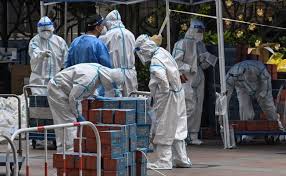Manas Dasgupta
NEW DELHI, April 14: Despite stringent restrictive measures virtually suffocating the 26 million population of Shanghai, the number of Covid cases in China’s financial hub continued to soar up even as the President Xi Jinping said the country must continue with its strict “dynamic Covid clearance” policy and pandemic control measures.
Though many residents threatened to break law tired of the forced confinement, the Covid cases in Shanghai surged to a record high of more than 27,000 despite more than two weeks of a stringent lockdown that still remains in place. The mainland Covid-19 numbers were also the highest: 29,317 cases including 2,999 symptomatic cases, according to the national health commission’s (NHC) daily bulletin released on Thursday morning.
Most of the 26 million odd residents of Shanghai remained confined in their apartments, in many parts not even allowed to come out in their own balconies or move round the open spaces in their residential compounds. The harsh measures in recent days have angered many residents who have also complained of food shortage as well as access to medicines for those suffering from ailments as they are not allowed to leave their homes even as the authorities were struggling to maintain supply to millions of residents.
Lockdown restrictions have only been partially eased in some localities, which have not reported fresh cases for two weeks.
The municipal health commission of Shanghai said on Thursday that the city currently has nine Covid-19 patients in severe condition since the resurgence of the epidemic in March. “Eight of the severe cases are older people aged between 70 and 93, the commission said, adding that all of them had high-risk factors such as serious underlying diseases, and none of them were vaccinated against Covid-19,” official sources said.
The city authorities saying there were only nine severe cases, most of which were linked to pre-existing health conditions, led to many on social media to question the need for a stringent lockdown more than two years into the pandemic and with a large share of the city’s population vaccinated.
Despite the growing criticism, Jinping on Thursday reiterated his backing for his government’s “zero COVID” approach. China is the only country following an approach of mass lockdowns and testing to eliminate cases more than two years into the pandemic and is also still isolated from the rest of the world with tight travel restrictions.
“Prevention and control work cannot be relaxed,” Xi was quoted as saying by the official media during a visit to the southern island province of Hainan. “Virus control measures must be strictly implemented”, he said, adding that “the antivirus campaign must minimise economic and social impact.”
The economy has also been impacted, with the government keeping Shanghai’s port open but the strict COVID-19 measures leading most factories to cut production. The official media, in the past week, has published a number of commentaries defending the “zero COVID” approach, warning that relaxing it would lead to thousands of deaths among the elderly and overwhelm China’s healthcare system. But the chances of further easing of the lockdown seemed to have waned after Xi called for sticking to current Covid-containing policies.
According to the state radio report, Xi said the country must stick to its approach, which has all but shut China’s borders to international travel, and not relax prevention measures. “It is risky for Covid-19 patients who are asymptomatic to stay home instead of in centralised quarantine, as they might cause further transmission and miss the optimal treatment period,” he said.
Wu Zunyou, chief epidemiologist at the Chinese Centre for Disease Control and Prevention (CDC) said, “Failure to detect and treat their symptoms in a timely manner may result in the continued spread of the virus and may also miss the optimal treatment period.”
The economic outlook is increasingly grim. “China, the world’s second-largest economy and the largest manufacturer, has been facing a rising risk of recession since mid-March. We believe global markets continue to underestimate the impact, likely owing to the majority of focus on the Russian-Ukraine conflict,” many economic experts maintained.

